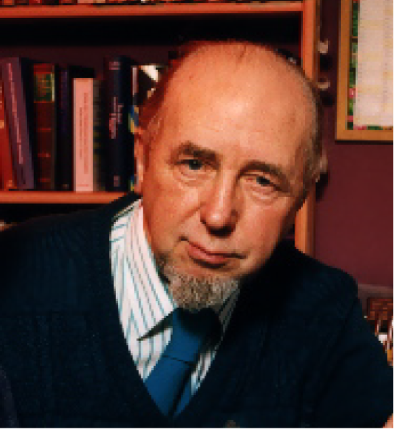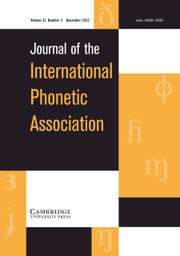
Jack Windsor Lewis, IPA member for almost sixty years and regular contributor to Le MaÎtre PhonÉtique and JIPA for over fifty years, died on the 11th of July 2021 at the age of 94 after a short illness. He is survived by his wife Jane.
Jack was born and grew up in Cardiff. An only child to loving parents, his childhood was very happy. While his parents were born in Cardiff, three of his grandparents were from different parts of England (Somerset, Shropshire and Berkshire). His maternal grandmother, who came from Carmarthen and whose first language was Welsh, lived with the family and was a second equally loving mother. His father was the manager of the largest chain of tobacconists in the city, and inspired in Jack a lifelong love of music, especially classical music and jazz. Jack attended the local primary school from 1933 to 1937.
Upon leaving Howard Gardens High School in 1944 with a Higher School Certificate in English, French and Latin, Jack enrolled at the University of Wales, Cardiff, but before he could complete his first year, he was called up for military service. After initial infantry training, he was attached to the Royal Army Education Corps and was assigned various duties, including teaching English and French to soldiers before their demobilisation. Returning to Cardiff in 1948 after almost three years in the army, Jack was disappointed to find little at his university to satisfy his interest in phonetics and linguistics, language classes being almost entirely literature-based. In 1951, he graduated with an honours degree in Medieval English, having taken courses in English, French, Italian and Archaeology.
Jack’s first lectureship after graduation was at Erith Technical College, Kent (1954–7). This allowed him to travel into London for phonetics courses at University College, where he studied under and became friends with A. C. Gimson and J. D. O’Connor, among others.
Next followed short posts lecturing in English and phonetics in Sweden (Swedish Folk University at Stockholm, Trollhättan and Uddevalla, 1957–8), Spain (Mangold Institute, Madrid, 1958–9) and Iran (University of Tehran, 1960–3) before a seven-year spell as Lecturer in English Phonetics at the University of Oslo (1963–70).
From the 1960s to the mid-1970s, he taught on and directed summer schools for the British Council and the University of London. In 1967, on one such summer school on the Teaching of Spoken English, he met Jane Peer, and in 1969 they began many years of happy marriage.
After a brief period (1968–9) as Professor and Head of Department of English at the Free University, Brussels, he settled down in 1970 as Lecturer in Phonetics at the University of Leeds, where he remained until his retirement in 1989.
Jack’s main interests included EFL phonetics, phonetic lexicography, intonation, phonetic transcription, and forensic phonetics. Of his numerous publications the three most groundbreaking were his little known Guide to English Pronunciation (GEP; 1969), which dealt with the particular problems of Scandinavians, especially Norwegians, his widely acclaimed Concise Pronouncing Dictionary of British and American English (CPD; 1972), and People Speaking (1977).
In his Preface to GEP, Gimson neatly summarises the innovative features of this work: Windsor Lewis’ attention to ‘variants appropriate to American pronunciation with which every English speaker should be familiar’, his description of English pronunciation ‘as it really is today’, and the introduction of many innovations in ‘his treatment of vowel description, gradation, rhythm and intonation’. For a reproduction and detailed discussion of this work, see Collins, Mees & Carley (2013).
CPD appeared in 1972. It was the first modern pronunciation dictionary to show throughout both British and American pronunciations. It used a qualitative transcription, abandoning what Jack liked to call the ‘redundant’ length marks, and contained the first mention of the term ‘General British’ for the British reference accent as a parallel term to the well-established ‘General American’. This label and its abbreviation GB were taken up in 2014 by Alan Cruttenden to replace the term ‘RP’, which for various reasons was no longer appropriate.
Jack’s next foray into phonetic lexicography came when he was appointed pronunciation editor of the third edition of the prestigious Oxford Advanced Learner’s Dictionary of Current English (Hornby, Cowie & Windsor Lewis Reference Hornby and Cowie1974). His contribution made it the first major EFL dictionary to supply American and British phonetic transcriptions for each of its 100,000 entries.
People Speaking was written chiefly as study and practice materials for EFL use. It was based on audio recordings of four actors giving naturalistic performances of dialogues and passages. These were then transcribed phonemically, phonetically and intonationally according to systems Jack had devised himself.
Retirement did not mean retirement from his passion for phonetics, for Jack remained extremely active in many different ways. He was a core member of the annual UCL Summer Course in English Phonetics from 1990 to 2011, and was also organiser of English phonetic summer schools held at the University of Murcia in Spain from 1993 to 1999. He was much in demand as a guest lecturer, and retirement gave him a chance to extend this kind of activity, travelling to over 80 universities worldwide. He was a founder member of the International Association of Forensic Phonetics (1991) and his expertise was often sought in forensic matters, the most notable being the Yorkshire Ripper case, where he, together with Stanley Ellis, successfully identified the geographical features of the voice on what turned out to be a hoax tape as coming from County Durham. (The Ripper was from South Yorkshire.)
We will greatly miss this charming, multi-faceted practical phonetician. He will be remembered for his good humour, generosity, hospitality and sense of fun. Fortunately most of Jack’s publications are available on his impressive website (yek.me.uk). The same holds true for his lively ‘Phonetiblog’ containing, as he proudly announces, ‘over 500 occasional postings’, the first of which took place in 2006 and which he continued to add to regularly until January 2018. That Jack had admirers all over the world is evident from the Festschrift his Japanese friends and colleagues put together for his ninetieth birthday (Phonetic Society of Japan Reference Tsudzuki and Masaki2017).



